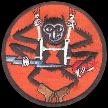
Paul F Smith
|
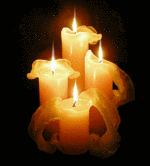 |
|
It's with great sadness that I must inform you
of the death of Paul F Smith. He passed away on October 20,
2014. We should never forget that this man has done for us; Rest in Peace
General Smith
thank you so much for our freedom. God Bless you! |
Many thank you to Sandra Smith (General
Paul Smith's daughter) for taking the time to answer all my questions about her
dad and helping me to write this article.
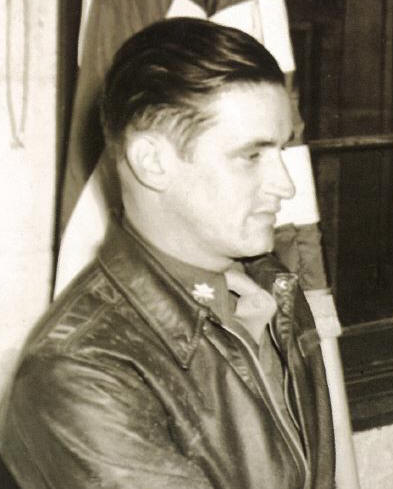
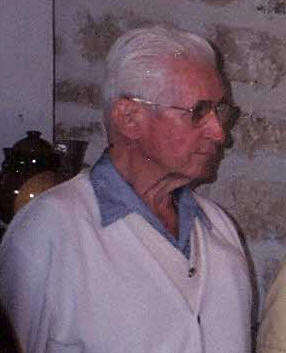
Paul
Francis Smith was born in Taunton, Massachusetts, November 15, 1915. His parents
were Frederick J Smith and Nora V Smith. His dad was a lawyer, a photographer,
he also participated in the founding of the small airfield of Taunton.
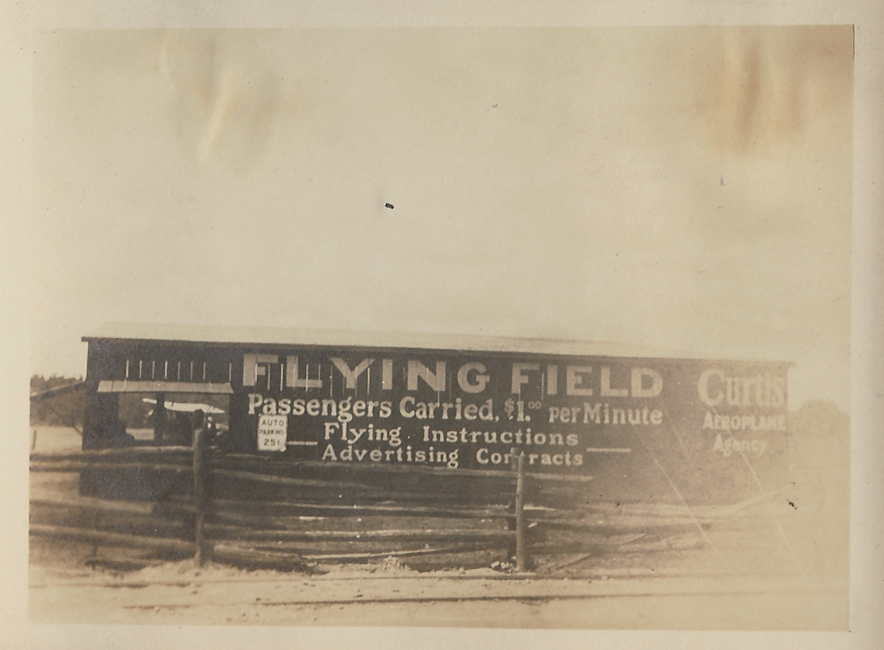
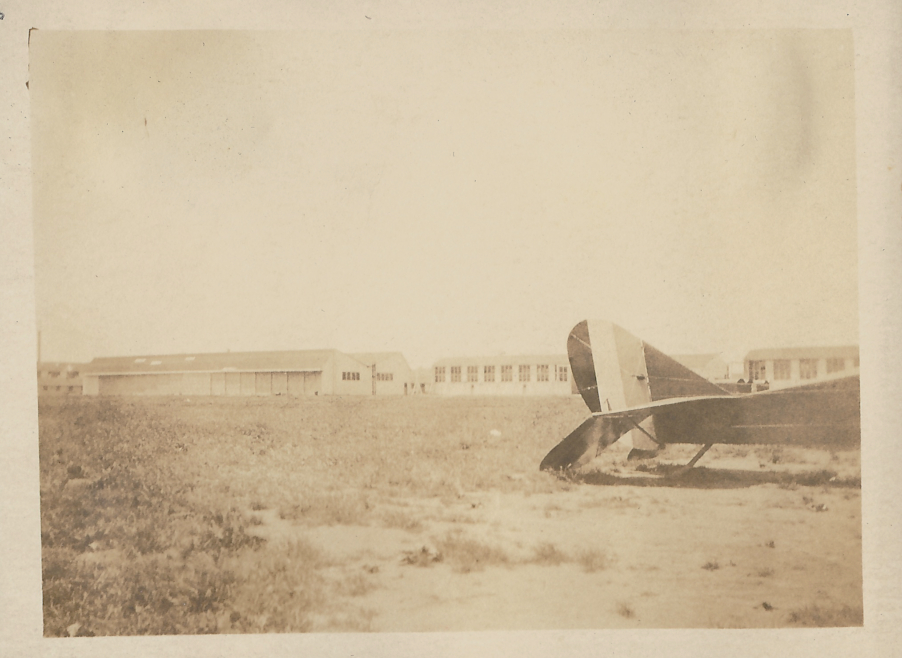
"His
father was a very adventurous man. He had a friend who was a pilot during the
World War 1. His name was Frederick K Smith. They had the idea of
rebuilding
a plane of the first war from surplus parts. They went to Long Island to New
York to get the parts. Built the aircraft and returned with in Massachusetts.
They crashed into a tree at 16 miles from home. "
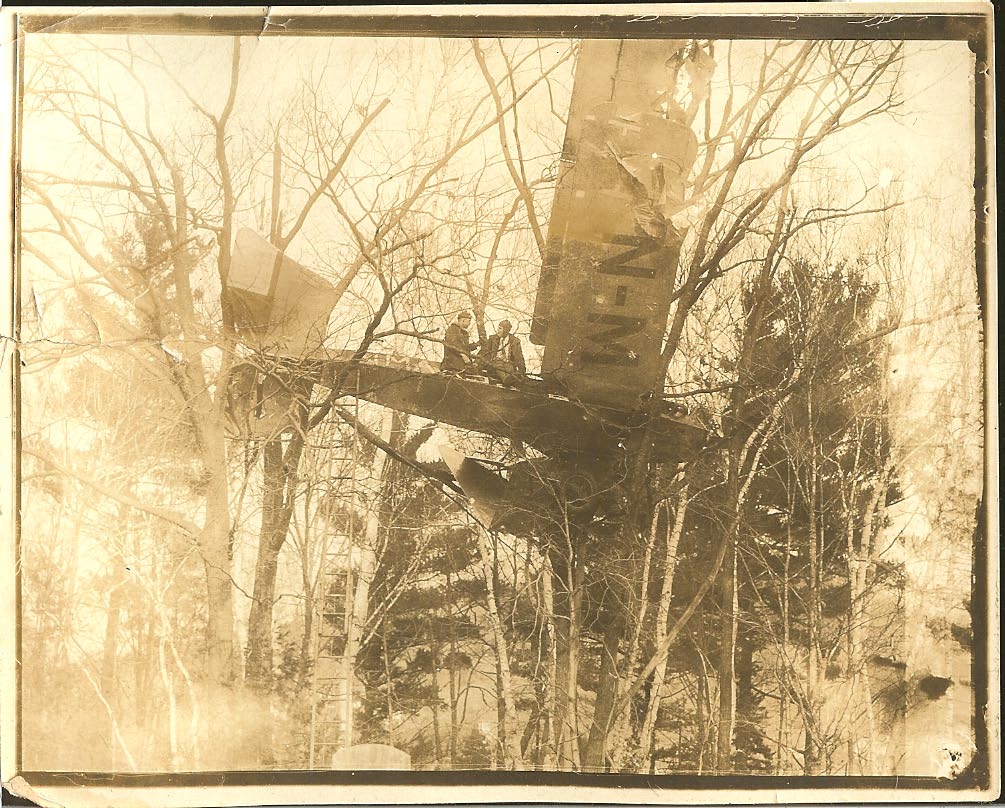
The
family had 4 children. Paul had two sisters. Patricia was born in 1913 and
Barbara born in 1922 and a brother, William born in 1919. During
the Great Depression, Paul is already 20 years old.
"He
remembers that the family was short on things like gas, butter, meat, but they
were not really affected by this period. His father still lost some real estate
investments. "
Paul
Smith studied at the St Marys Grammar School and then at Taunton High School.
From 1935 to 1942 he was in the army reserve.
"My
father was in the ROTC (Reserve Officers Training Corps) when he was in high
school and he was in the Army Reserve, where he took courses and he had to pass
tests including map reading, battlefield operations, weapons and ammunition,
etc. ... "
In 1942,
he became a 2nd Lieutenant, and then it is part of a tank battalion at Fort
Knox, Kentucky.
"One day
he saw some men with tall boots. He asked: "What the hell are those guys?" He
was answered that they were paratroopers. He then said: "Where do I sign up?
That's what I want to do! "
On 4
August 1942, 2nd Lt. Paul Smith was assigned to the 507th PIR had
been formed in June 1942. He was appointed 1st Lieutenant and given command of
Company F of the 2nd Battalion. He followed the training of parachutists with
his men.
"Dad
dedicated to training his men so they would not get killed. He knew all 130 of
them by name. Today he still receives Christmas cards from some of them. "
Together
they spent their paratrooper performing 5 jumps regulatory:
"Everything went well for him, he said he was afraid maybe the first 3 or 4
jumps, but after that it was like driving a car."
On 24
April 1943, 1st Lt. Paul Smith is promoted Captain. November 23,
1943, the 507th PIR was transferred to Camp Shanks and then to Fort Hanilton in
New York before embarking on HMS Strathnaver and the Libertyship Susan B Anthony
who sailed for England.
"He was a
good trip, especially busy with the organization of new soldiers. But he said
that the food was terrible and they slept in rotation. He was very happy when
they were able to get off the ship! "
The 507th
PIR was arrived in Northern Ireland in December 1943. It was at that time
attached to the 82nd Airborne Division.
"Most
citizens of Port Rush were relocated elsewhere, but those who stayed were
fantastic with the 507, inviting men to social gatherings, dinners at their
homes, drinking beer at pubs, etc ..."
In
Ireland, the drive continued, but it will be limited to 3 months. Indeed, March
11, 1944, the regiment through Scotland by train and arrived at Tollerton Hall
in Nottingham, England. In England, Capt. Paul Smith received permission to go
to England.
"He went
in Rest & Relaxation, a hotel. That day, the Germans were bombarded with V1, he
was struck in her bed! Still in London, he entered a pub and sat down next to
the son of his neighbor in Taunton. The son of an airline pilot! He was an RAF
officer (even if he was American), who was intelligence and charted sites
bombing. "
Paul
remembers training in England there was no parachute because observations
German. The training focused mainly on survival, how to escape and learn some
rudimentary French.
"It was
the French base, from 1 to 10. He remembers a few words like
Bonsoir,
avec pleasure, bon ami, croissant, ooooo lala !
Le Bosch ? "
May 28,
1944, the men of the 2nd Battalion are stationed near Barkston Heath Airfield.
Things become clearer for the paratroopers. They are in a highly secured area
and cannot get out.
"He
remembers he was memorizing sandtables with landmarks. Decided also what squad
would embark on any aircraft, the missions of the Platoon Sergeants. "
At
twilight on June 5, 1944, the troopers boarded the C-47 and one minute before
midnight, they take off.
"The
flight went well. Some of his men were sleeping, others smoked. The trip was
good until they flew over Normandy. Firing flak began.”
His plane
was hit but no major damage. Paul Smith was jumpmaster. He was sitting near the
door, he could see the landmarks on the ground including the Douve river, so he
knew where they were. He waited for the green light. But it never happened.
Therefore, he ordered his men to stand up, hook up and then they jumped! Between
heaven and earth, Captain Paul Smith could see the fire from the German Flak
took off into the sky.
"Dad
landed in a field near a road. He was alone. After removing his parachute, he
went up the line to drop reunited with his stick. He was unable to locate on the
map! And because he was more than 4 kilometers from the DZ! Later, he found
elements of his unit commanded by Major Pearson (chief of the 2nd Battalion) was
in his unit during the jump. A he afraid? Fuck yes! But he tried not to show it.
He wanted his men to be full of confidence. But he was especially angry, not
having been dropped on the right DZ ... "
Later,
the group came upon a small farmer in a dirt road. The man was not surprised to
see them.
"He
pointed to the American flag on the shoulder of my dad and said American? My dad
asked where the Krauts were. The farmer pointed to the north, southeast and
west. The farmer stated that they were near their village of Ham. "
Finally
knowing where they were, the group headed to the village of Amfreville that was
his objective. Along the
way they recover isolated including a radio operator paratroopers. Throughout
the movement, the radio tried to join the battalion headquarters but without
success. Major Pearson then decided to contact Colonel Millet, commander of the
507th PIR. Millet conveys its coordinated and the group sets off to meet him.
Along the way, they will have several firefights. On June 7, it receives new
location coordinates of Millet’s HQ. Colonel warns he sends a scout to their
meetings. At the edge of the woods, they meet Sergeant Barney Hopkins (D Co):
"A German
motorcycle came towards them, they took the driver and motorcycle hid in a
ditch, covered with branches. Then came a convoy consisting of two full
provision trucks, ersatz, blankets, clothing, ammunition, food, boots ... They
swayed grenades into the truck and killed the Germans. They tried to ersatz
eaten, but they found it horrible! They eventually set fire to trucks and left.
"
They
finally arrived at the headquarters of Colonel Millet, where they settled in
defense, undergoing several enemy attacks. June 8, Captain Smith receives the
order to proceed to the Merderet to get in touch with another group of
paratroopers who are under the command of Lt. Col.. Shanley (508).
The group
of 250 paratroopers and 90 prisoners made
movement.
Captain Paul Smith with Lieutenant Roger Whiting closes walking. At this time,
two MG-42 machine guns opened fire on the column. Paul Smith volunteered with
Lieutenant Whiting to distract the enemy while the column collapses.
"He was
the edge of a lined with hedges with Lieutenant Whiting Field, They shot turns
on a machine gun nest. German jumped a fence and tried to stab dad with his
bayonet. Dad grabbed the bayonet, and took care of German. He was wounded by the
bayonet. He bandaged himself before being treated later by Sergeant Hopkins. He
was afraid they would take him out of combat...
He didn’t
seek medical attention.
He didn’t
want to leave his men."
They
eventually join the group that was stopped to rest. Paul Smith says that
something is wrong when he realizes that the column does not restart. In fact,
some had gone back, but the man who liaised between the first and the second
half was asleep. Therefore, being the highest ranking officer, Captain Paul
Smith finds himself at the head of 150 men and 90 prisoners. Knowing the
mission, he decides to pursue.
Shortly
after, Captain Smith decides to organize a defensive perimeter in a field until
friendly troops are located. At this time, they found themselves under heavy
German fire.
"The
radio wanted to surrender, my dad told him: FU **, go sit behind that hedgerow
and don’t bother me till war is over! My father left him there!"
Radio, he
finally returned in radio contact with Lt. Col. Maloney gives him the order to
hold the position. Later, a Lieutenant-Colonel who accompanied Colonel Millet
among their positions accompanied by about thirty men. The officer announced to
Captain Paul Smith that the Colonel was captured and a large German detachment
towards them. The officer gave the order to Captain Smith to follow across
Merderet. Captain Smith opposes this order explaining the orders he received.
But the officer is ranker to him; he is he who has the last word. The
officer ordered him to take 4 or 5 men and pave the way to cross the river. He
crosses under fire but without being a victim.
"Dad
remembers that during this journey, many prisoners were killed, but luckily not
a single American was touched. "
Once on
the other side, the officer left the company of Captain Paul Smith. Paul took
the opportunity to report his new position to Lt. Col. Maloney. He takes
prisoners in a POW camp provisional and wounded to a rescue station of the 505th
PIR. During
the fighting in Normandy, Paul Smith was promoted XO (Executive Officer) of the
2nd Battalion. He was raised to the rank of Major.
"He's
become 2nd Bn XO before leaving Normandy. At this time, many officers were KIA,
WIA or POW. He was very happy about this promotion. By cons, he was worried
about his replacement, Captain Oliver L Case. He was a replacement. "
These men
were also happy and nervous for the same reasons.
"After
the war, some men of Company F told me about my father. They told me they were
very tough on them. But it did not take them for shit. They understood that he
was making sure they survive to the war. F Company lost about 25 men in
Normandy. "
The XO’s
main focus is handling administrative duties for his unit, especially
ensuring that paperwork, such as the unit's payroll reports, is completed
properly and on time. Its main
task is to manage the unit administratively. Especially in terms of logistics,
since the number of balls to the number of sheets of typing paper. In addition,
it also takes care of the equipment unit, the weapons and vehicles are
sufficient numbers and are statements. Finally, it also assists the CO of the
unit in strategic planning, including collecting all the reports of other units.
Paul
Smith remembers a funny memory:
"That
happened in mid-June. Sergeant Hinchliff and Captain Brummit walking in a field.
A cow fell in love with Captain Brummitt and ended up on his back. A soldier
drew to kill the ox madly in love. But Hinchliff prevented. He ended up chasing
the cow. Hinchliff was Wisconsin is the cheese capital of the United States. He
had grown up in the midst of cows. He told that he had never seen such beautiful
cow in France or Belgium. It was very sad to see them dead. Like what, everyone
loves paratroopers, even cows. "
Colonel
Millet captured, a new officer takes his place, Colonel Edson Raff. He is a
veteran of the fighting in Italy at the head of the 509th PIB.
"Nobody
liked Raff, he had a very bad reputation. He was at the head of troops in Italy,
they all got killed! After Normandy, England, he had built a fenced in area at
their post in England and he put the bad paratroopers, who were in town and were
beaten or had been drinking. The guys were in their underwear to humiliate them.
No soldier of the 507th loved Raff. He was a small man with big complex. "
The 507th PIR left Normandy July 11, 1944 and returned to England. The losses of
the regiment was 938 killed, wounded or missing.
The regiment was sent to Barton Stacey. There, the 507th was detached from the
82nd Airborne to be attached to the 17th Airborne, who had just arrived in
England. Many soldiers were angry about it, but not Major Smith.
His big worry was the incorporation of replacements.
"Many
good soldiers had been killed or wounded in Normandy. New replacements were
poorly trained. It was hard to train men to become paratroopers. They had to be
formed in two months. Not enough time to make a good soldier. "
The drive
included with the hope of spending Christmas in peace. But on December 16, the
Germans launched their will against attack in the Belgian Ardennes to the
biggest surprise of the Allies.
At this
news, Major Smith knew they would have to go. Paul
Smith does not remember exactly the fighting that took place during this period
probably because they were terrible.
"He does
not remember much. He was
suffering from dysentery and could only drink whiskey for two weeks. He also
remembers talking to men, their advisor to put their socks under the arms to
keep them warm. He remembers he was very cold, but he found a fur-lined cloak on
a dead German soldier. The fighting was terrible, he remembers a wounded soldier
on a stretcher carried by two men. And BOOM, the Germans have made
mortars
exploded. He remembers frozen dead men body.
He said
that the fighting was most terrible in Normandy. Many very bad injuries from
splinters trees. When they touched a man, it happened that he severs an arm or
leg. He remembers men in their foxholes and in my minute, they were blown into
small pieces. He will never forget the sound of either Nebelwerfer. During
the Battle of the Bulge, he was wounded by shrapnel that fell from the sky
touched the rim of his helmet and slipped into the tip of his nose. A lot of
blood, but not a bad injury. The shine is still there, you can feel it and he
still has shrapnel in cheek triggering alarms at airports.
He was also
wounded in the
buttocks.
He does not realized, someone who told him he had blood. He was found Captain
Claudill, the surgeon of the 2nd Battalion who stitched. "
From
January 12, the Germans began to withdraw from the bulge. The American units
chased after them. The axis of advance is north to the British Forces.
"The
headquarters was located on farms or abandoned home or church. Dad never met a
Belgian civil. It happened as they install the HQ under a bridge, or simply put
the truck in a circle and they came up tents or in foxholes. "
On 14
January 1945, the 507th PIR ends up come into contact with the 51st British
Highland Division advancing southward blocking the withdrawal of the Germans.
"My
father remembers a British officer, a captain, had invited him to tea.
My Dad joined him and was astonished to see porcelin tea cups and teapots with
linen tablecloth and silver spoons.
The soldiers were always spotless, boots, uniforms brushed up button. When my
dad asked why, the officer answered, "If we Brits,are going to die we will look
damn good doing it!
It was
the Black Watch, dad remembers that when he went into battle, he shouted,
screamed to fuck scared the Germans. "
Then,
during the Rhineland Campaign, Major Paul Smith was again promoted. So that the
regiment would take defensive positions along the Our River, the jeep carrying
the commander of the 1st Battalion, Lieutenant-Colonel Ben Pearson jumped on a
mine. Seriously wounded, he was evacuated to the United States:
"Dad
attended the scene. He remembers seeing the "Red" Pearson’s helmet fly. My
father thought he was dead. He remembers that Pearson’s legs were broken.
Captain Howard Stephens, whom he knew from Nebraska became his XO. "
The 507th
remained along the Our
River
with a rotation between battalions. Two battalions to fronts, and a battalion at
rest. The main actions were patrolling and attempted raid on the other side.
They remained there until 10 February 1945. They were
relieved by troops of the 6th Armored Division. For the 17th Airborne the time
had to prepare for the future airborne operation. For the 507th PIR, it would be
his second combat jump.
"For
Operation Varsity, my father told me he already knew since Houffalize."
The 507th
PIR was sent and the rest of the division to Chalons sur Marne, France for rest
and especially for training for the Operation Varsity.
"During
this time, Dad received permission to London, he remembers bombardment V1, it
had boosted his bed. He says that as long as you hear the sound of the V1, all
was well. When the sound stopped, you could not hope to get away alive. "
During
this period in Chalons, the regiment received new recruits and resumed workouts
including several parachute jumps. March 19, 1945 , the 1st Battalion of the
Major Paul Smith as well as the headquarters of the Regiment are sent on the A40
airfield near Chartres where they will take off on March 24, 1945. This area is
under high security to prevent the enemy being informed. Nevertheless, the
Germans know as propaganda radio, Axys Sally, sending personal messages to the
17th Airborne :
— You of
the 17th Airborne need not wear your parachutes.
You could
walk down on the shrapnel that we have waiting for you!
In this
high security zone, men learn every detail of their operation. Aerial
photographs , models made
of
sand tables , for veterans of the 507th , it reminds them of the preparation of
D- Day. The
objective of the 507th PIR is jumping on the DZ W located northwest of the city
of Wesel, Germany. After assembled, the regiment must secure its sector and
especially the woods to the east and north through the help of the 15th Infantry
Division. At 7:30
am, March 24, 1945 , the first carrying the paratroopers of 507th PIR off and
join the training device pointing towards the Rhine River. This account armada
1,588 C-47, 72 C-46 42 C-54, more than 1,300 gliders and protected by 889
fighters of the RAF and USAAF.
"Dad
remembers watching the door of the aircraft and could see hundreds and hundreds
of aircraft wherever his gaze was. He was in the C-47 Chalk 4 with Captain
Schwartzwalder and 1st Lieutenant John Marr. Getting
over the Rhine River, he could watch few planes hit and crashed in flames."
As
jumpmaster, Major Paul Smith was the first to jump. The mission of the 1st
Battalion is to be placed in reserve in the north of DZ W after the landing. But
the C-47 carrying the 1st Battalion and the headquarters of the regiment
involves dropping paratroopers 2, 5 kilometers to the northwest of the DZ
planned, near Diersfordt in an area assigned to the 513th PIR. Combining into 3
separate groups, they engage in combat with the German artillery positions. The group
that controls the Major Paul Smith has nearly 200 paratroopers. After destroying
several enemy positions, they must fight Panzers. They destroyed two Panzers IV
with the new 57mm recoilless gun. Colonel
Raff having 90% of its workforce now grouped 1st Battalion, he began to attack
the Diersfordt Castle. Until it reaches the 3rd Battalion. At this time, the
Major Smith’s Battalion was placed, as expected, in reserve.
During
the first day of combat, Major Paul F Smith was awarded the Bronze Star:
Lieutenant Colonel Paul F Smith, 0444090, Infantry, for heroic action against
the enemy near Wesel, Germany, on 24 March 1945. After his battalion had been
droppped on the wrong drop zone, Lieutenant Colonel Smith (then Major) organized
the scattered battalion and personally led them in an attack on Diersfordt
Castle which had been mentioned in briefing as the best OP and strongpoint in
the area. Although heavy fire soon held up their advance, Lieutenant Colonel
Smith moved about among his men without regard for his personal safety,
inspiring them to hold their positions and bring fire on the enemy positions in
and around the Castle. The fearless actions of Lieutenant Colonel Smith were
largely responsible for the success of his men bringing heavy fire on the enemy
which enabled another unit to approach and assault the castle successfully. His
action were in keeping with the highest standards of the Military Service.
March 25,
1945, the 3rd Battalion replaces the 1st Battalion was sent to the front to
clear the last pockets of resistance. Then it's
advance towards the heart of Germany. The 507th PIR took turns cities
Pedbemberg, Schermbeck, Wulfen.
On March
29, 1945, while the progression of the regiment is 40 kilometers, and is
attached to the XIX Corps and sent to Haltern to face against a German attack.
It is
Haltern that Major Smith received his Silver Star:
Lieutenant Colonel Paul F Smith, 0444090, Infantry, for gallantry in action
against the enemy near Haltern, Germany, on 28 March 1945. Lieutenant Colonel
(then Major) Smith was with the forward elements of his battalion in the attack
on Haltern. Enemy resistance had been exceptionally heavy and in several
instances the battalion had been pinned down by fire. On each of these occasions
Lieutenant Colonel Smith, with complete disregard for his own personal safety,
exposed himself to enemy fire and continuously moved from one flank to the
other, maintaining absolute control of his battalion. His personal courage and
sound knowledge of tactics served as an inspiration to the officers and men of
his battalion and resulted in taking the objective with a minimum delay and
casualties. His actions were in accord with the highest standards of the
Military Service.
April 2,
1945, the 507th PIR took the town of Muenster. On 6
April, 1945, the Major Smith’s Battalion moved along a canal located on the
heights of Bottrop with the 3rd Battalion. Even if the war comes to an end, the
enemy is still present and bombarded some times, the positions of the
paratroopers while the paratroopers attack the opposite shore. On April
9, 1945, the men of Major Paul Smith leave to attack under heavy fire from
German barrage. The next day, Essen, homeland of the Krupp steel company is
reached. On April 12, the order is given to attack Duisburg will be invested at
midnight. Then, the
507th PIR is sent along the Ruhr River to the south of Essen between Kettwig and
Dalhäuser to repel the German last chance counter attack.
"Dad does
not remember much of the fighting. He remembers that on the road to Essen, many
German surrender. They wanted to end the war. He remembers the AutoBahn where
rested many carcasses of enemy tanks. He remembers that the city was defended
primarily by Volkssturms, consisting mainly of young boys and oldmen. Essen was
ruined, children were hanging out in the streets, hungry and alone. He
remembers the Krupp factory, he had chained Lithuanians. Near a ice cream
factory, he recalls having seen the bodies of Displaced Persons killed. "
When the
war was over, the 507th received the very important mission of administering the
Essen area, more than a million German but more than 250,000 people displaced.
«One of
its missions was to organize trains to repatriate displaced persons to their
homes. There was a lot of Lithuanians and Russians. It was the hardest thing,
check the Displaced Persons . Because they wanted to take revenge on the
Germans. These
people lived in wooden barracks, slept on wooden bunk beds. The camp was
surrounded by barbed wire. One night there was an incident, Russians (mostly)
fled the camp and went to an ice cream factory where they were used. At the
time, they had stolen a little daring ice they were beaten, killed. They
massacred all the employees who were there. My father remembers that there was
blood from floor to ceiling . The vodka was fueled their thirst for revenge.
The
horrors of the Nazis, he saw a camp gathering people for forced labor in Krupp
factories. Corpses stacked. He ordered the inhabitants of Essen bury them in
separate graves. He could not believe that the Germans accepted that deal with
other human beings in this way. "
When the
war was over, Major Smith was in Essen. He learned that Hitler had committed
suicide as a coward. He remembers toasted with Major David Brummit. After May
8, 1945, Major Paul Smith received permission for a rest and relaxation center:
"He went
to the French Riviera with Major Morgan Brakonecke and Captain Miller. He spent
five days at the beach, drink beer, eat good food, sleep in a good bed and
especially take many baths. "
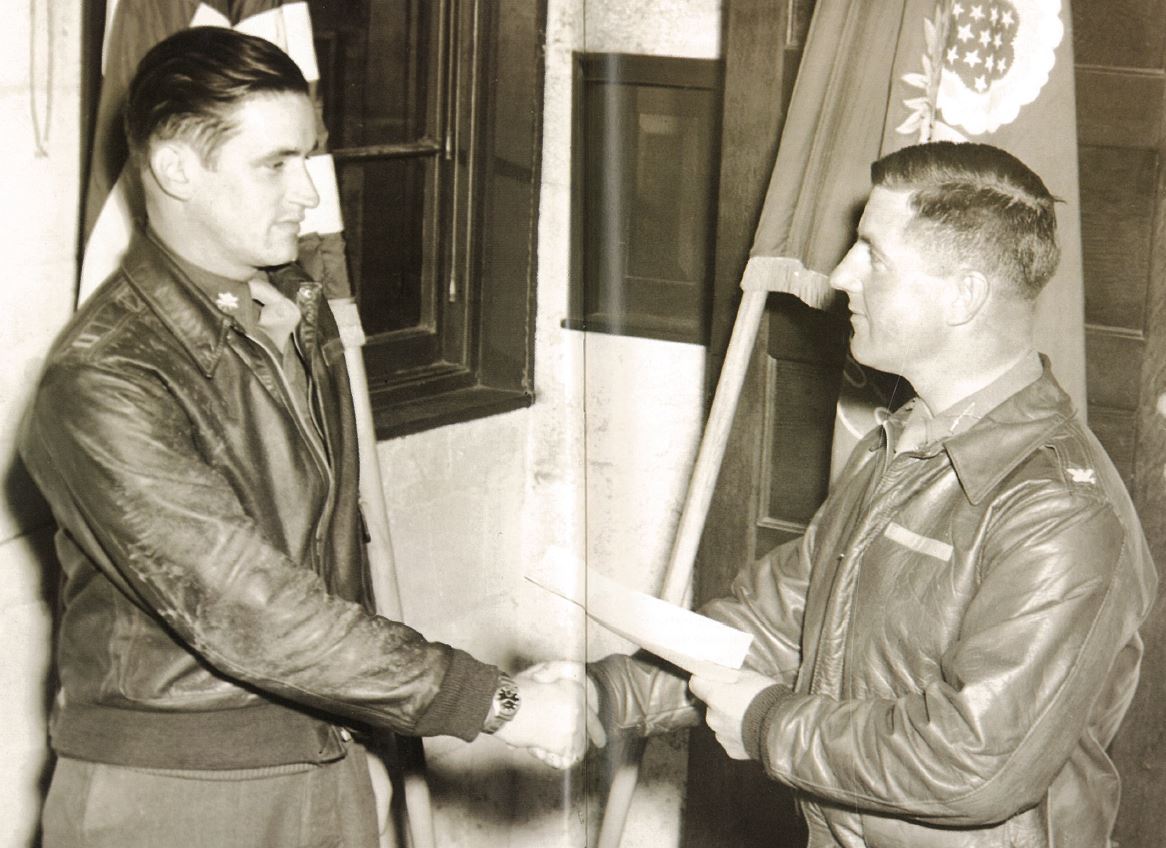
April 25,
1945, he was appointed Lieutenant-Colonel. In mid-June the 17th Airborne was
moved one last time. It went to France. The 507th PIR moved to a camp in Epinal.
"He
remembers being at a concert Heifetz in a cathedral in Germany (or France). When
he returned to camp, his brother Bill was waiting. He was part of an engineering
battalion and had received the news that he would be redeployed in Japan. Of
course, there was not, his ship turned around in the Pacific after the Japanese
surrender that followed the two atomic bombings. "
In
Epinal, began the largest exchange troops in the history between men who had
enough points to go home and those who had to stay longer in Europe.
"This was
the case for almost all the men of the 507th PIR had Normandy and then Varsity.
A few that had been wounded in Normandy and returned to 507 still had to stay a
little longer."
Lieutenant Colonel Paul F Smith left Europe September 15, 1945, after 21 months
spent overseas where he participated in four campaigns and made
two
combat jumps.
He said
about German soldiers:
"I was
doing my job, they were on their own, that's all. Soldiers Volkssturms they were
poor guy. Old people and children. Some had no uniforms, most wore his own gun.
Most had hungers and were happy to surrender. The SS were loyal to Hitler
soldiers. They also made their job, and they were damn good. "
Upon rotation to the United States in Novembre 1945, he served as the Executive
Officer and then Commanding Officer of the Airborne School Regiment, Fort
Benning, GA. During that period (1946) General Smith was integrated into the
regular Army. He later became an Instructor in the Academic Department of the
Infantry School at Fort Benning, remaining in that assignment until he attended
the Command and General Staff College, Fort Leavenworth, Kansas, in June 1948.
After graduating from the Command and Staff College he was assigned to the G-3
(Operations and Plans) Section, Headquarters Eight US Army in Yokohama, Japan.
When the Korean War erupted in June 1950 he was among the first to arrive in
Taegu, Korea to establish Eight US Army (Forward). He served in Korea through
five campaigns earning the Legion of Merit. In 1951 he departed Korea for Tokyo,
Japan, an operation assignment in the Headquarters, Far East Command.
In 1952 he returned to the US and the Pentagon where he served on the Department
of the Army staff successively as an operations officer, Assistant Secretary of
the General Staff, and Military Assistant to the Secretary of the Army. He
departed the Pentagon in July 1956 for the Army War College in Carlisle, PA from
which he graduated in June 1957.
General Smith returned to Europe in the summer of 1957 to command the 2nd
Airborne Battle Group, 504th Infantry, 11th Airborne
Division, and, subsequently, to serve as Chief of Staff, 24th
Infantry Division in Augsburg, Germany. He followed with staff assignments at
Headquarters, US Army Europe in Heidelberg, Germany as Deputy Chief of Staff,
Administration and Logistics, and subsequently as Deputy Assistant Chief of
Staff, G-1 (Personnel), before returning to the United States in June, 1960.
Beginning in the summer of 1960, he served successively as Assistant Chief of
Staff, G-2 (Intelligence), and Deputy Chief of Staff for Operations and Plans,
XVIIIth Airborne Corps, Fort Bragg, North Carolina.
General Smith departed Fort Bragg upon his promotion to brigadier General in
June 1964. His next assignment found him Chief of the Army Section, Military
Assistance Advisory Group, Republic of China, on the island of Taiwan. As
concurrent functions he was charged with Army planning for the Taiwan Defense
Command and with Commanding US Army Forces, Taiwan Defense Command.
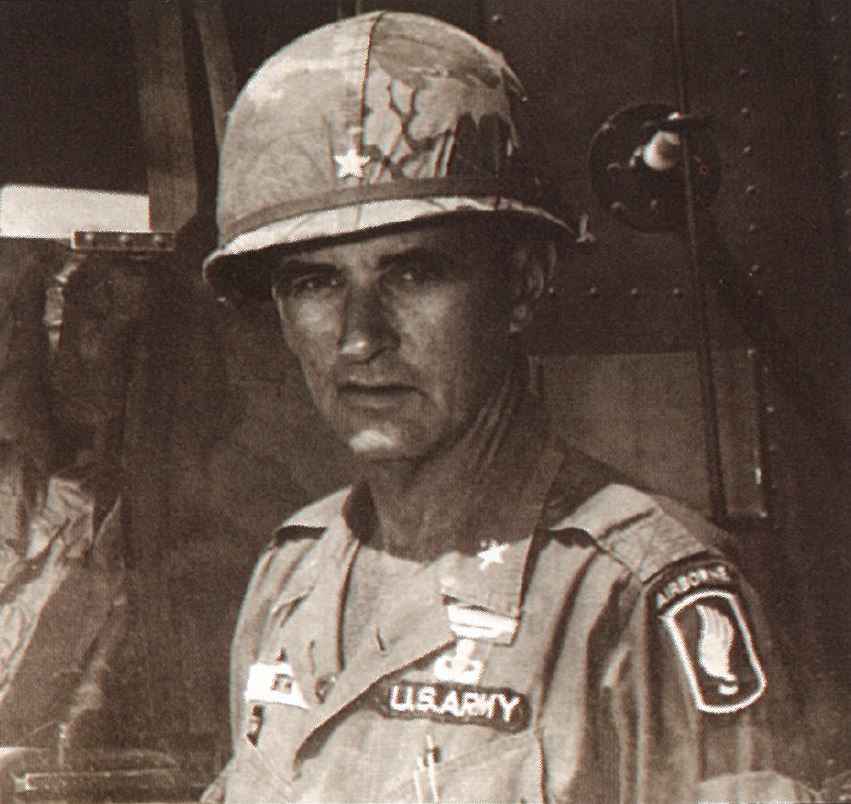 <= Au Vietnam
<= Au Vietnam
At the beginning of the US military buildup in Vietnam during July 1965, General
Smith, on short notice, was drafted from Taiwan to establish a new US
headquarters in Nha Trang, South Vietnam. After opening and organizing the
headquarters he became a Deputy Commanding General and Chief of Staff, Task
Force ALPHA – later redesignated Field Force Vietnam. In February 1966, General
Smith assumed command of the 173rd Airborne Brigade (Separate), the
First US Army combat unit to reach Vietnam.
In November 1966, General Smith was promoted to Major General and in December of
that year he relinquished command of the 173rd Airborne Brigade to
become the Deputy for Revolutionary Development to the Deputy Ambassador with
station in Saigon. In June 1967 General Smith departed Vietnam having
participated in three Vietnam campaigns and having won the Distinguished Service
Cross, Distinguished Service Medal a second award of the Silver Star, the Air
Medal with four oak leaf clusters, the National Order of Vietnam, Fifth Class,
and two awards of Vietnam’s Cross of Gallantry with Palm.
Citation Distinguished Service Cross:
The
Distinguished Service Cross is presented to Paul F. Smith, Major General, U.S.
Army, for extraordinary heroism in connection with military operations involving
conflict with an armed hostile force in the Republic of Vietnam, while serving
with Headquarters, 173d Airborne Brigade. Major General Smith distinguished
himself by exceptionally valorous actions on 19 November 1966 while commanding
the 173d Airborne Brigade on a search and destroy operation near Minh Thanh.
Despite the extreme hazards involved, he boldly chose to visit a forward patrol
base that had been under sniper and claymore mine attack for three days. At the
time General Smith arrived, the perimeter was only manned by a skeleton force,
but he insisted upon visiting the troops that were on line. Within ten minutes,
two platoon patrols outside the camp were pinned down by a large Viet Cong force
and the perimeter was again ravaged by intense hostile fire. Unmindful of the
dangers, General Smith refused to take cover and calmly proceeded among the
defenders, encouraging the men in their foxholes. Throughout the three-hour
battle, he provided tactical advice to his subordinate commanders. At one point,
the elements under severest attack were perilously low on ammunition, but
because of devastating ground fire aerial re-supply was prevented. With complete
disregard for his safety, General Smith fearlessly exposed himself to the hail
of bullets and directed an armed helicopter strike on the charging Viet Cong.
This courageous and timely action enabled the supply aircraft to land and
allowed the besieged camp to finally repel the insurgent force. Later after the
wounded had been evacuated, he conduced an aerial reconnaissance of the area an
discovered a large cache of rice and supplies. His unimpeachable valor and
profound concern for his men turned impending disaster into a major victory over
a numerically superior hostile force. Major General Smith's extraordinary
heroism and devotion to duty were in keeping with the highest traditions of the
military service and reflect great credit upon himself, his unit, and the United
States Army.
In July 1967 General Smith was Chairman of a special study group working in the
office of the Chairman, Joint Chiefs of Staff n long range study projects for
the Joint Chiefs of Staff and the Secretary of Defense.
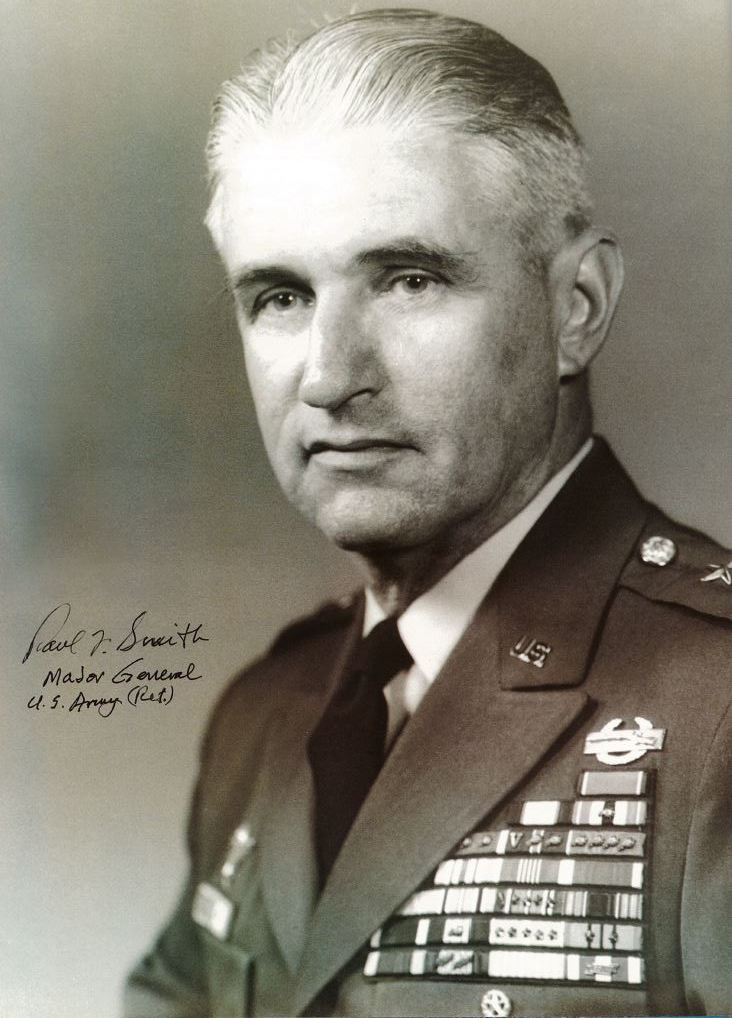
On August 11st 1968, General Smith retired from active Service. Return to
civilian life, he became Executive Director of the Development Committee of
Central Florida.
"He
helped the development of the Central Department of Fire, the University of
Central Florida , the nightclub district of Orlando, Disney World, the Orlando
International Airport. "
In 1974
-1975 , he took his final retirement .
"He
bought a 28-foot boat , a Christ Craft Cabin Cruiser and it was his work for the
next five years . We walked everywhere in Florida and Ocean twice. "
Paul
Smith married with Daisy in 1943, when he was at Nebraska. They had two
children, Robert (1947) and Thomas (1951). Paul and Daisy separted in 1953.
Paul
Smith remarried in January 17, 1947 with Margaret McClintock. But at the age of
21 years, Margaret had a serious accident preventing him from having children.
Therefore, Paul and Maggie adopted, first Sandra:
“I was
born in Stuttgart Italian and German parent. They were poor. Mom and Dad adopted
me when I was 8 months then they adopted my sister Sonja who was 18 months older
than me. "
“Sonja
had two children, two lines that had two boys and three girls. Bob had a
daughter who was a boy I think. Tom has not had children. I have not had
children.
Mom died
on 2 June 1996. "
Today,
Paul F Smith Centenary :
"He has a
very quiet life, he sleeps, he eats and goes to his appointments with the
doctors. He enjoys listening to music, classical and swing. "
Since the
end of the war, Paul Smith returned on one occasion in Normandy, at the
inauguration of the monument to the 507th PIR Amfreville.
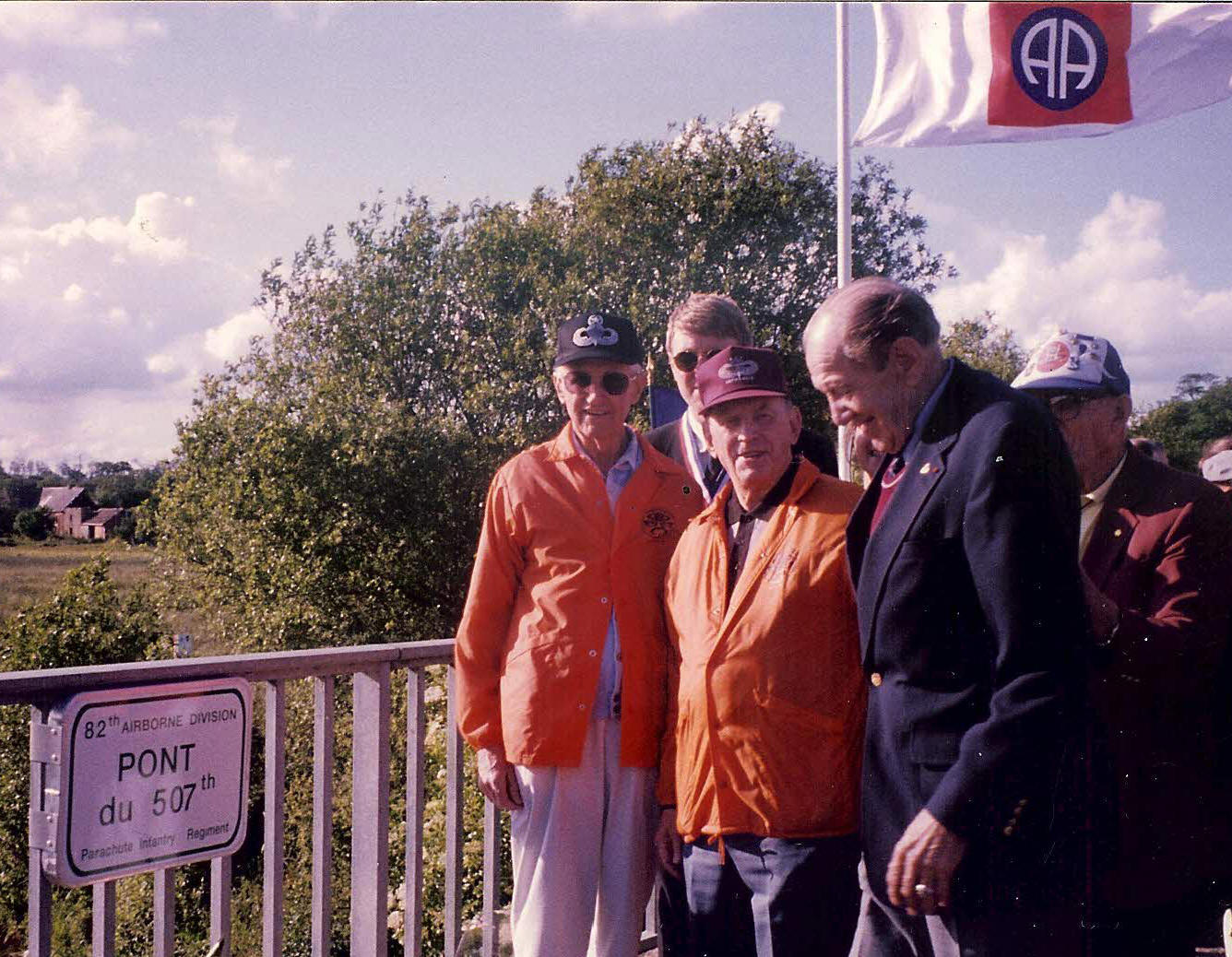
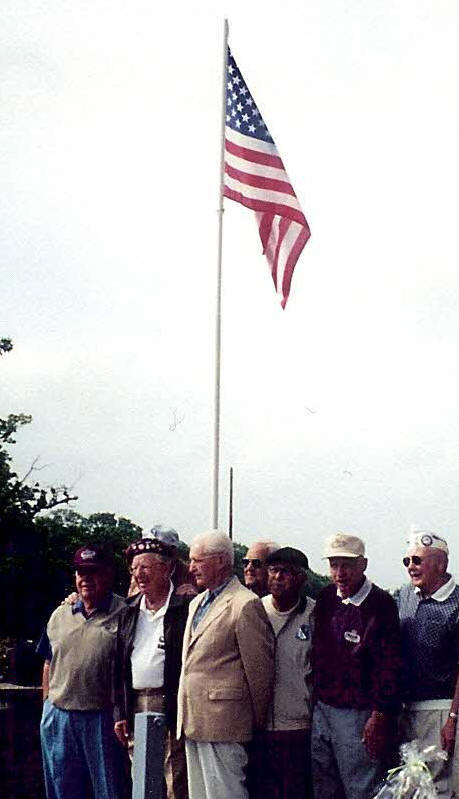
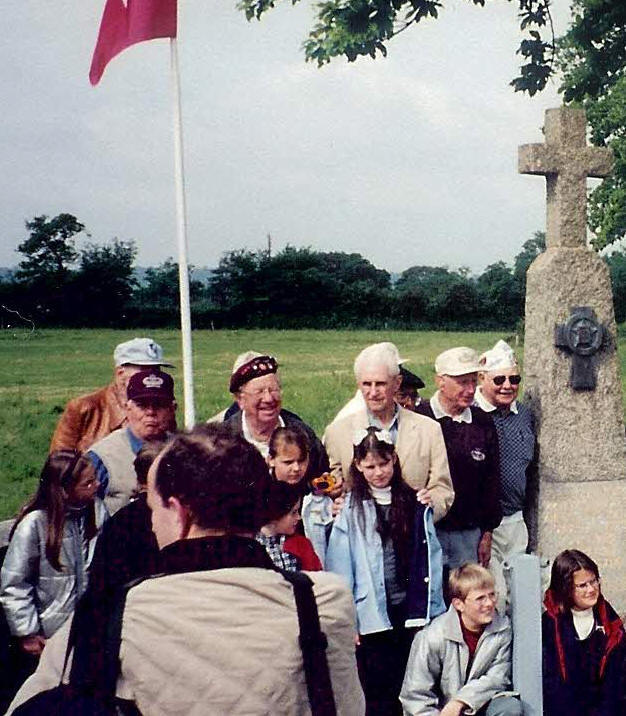
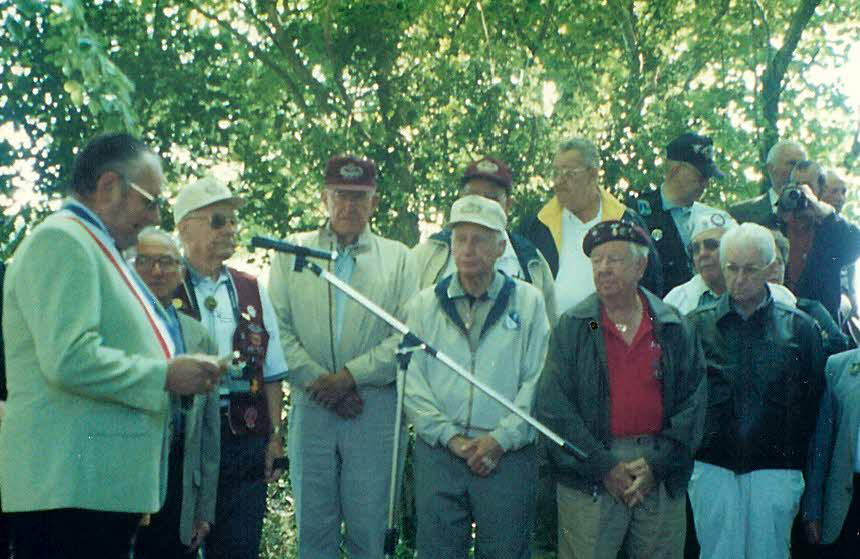
"He lived
in Germany in the 50s with my mother. They traveled throughout Europe during
this period. I guess they were in Belgium. "
Of the
war, He still has his 507 "Black Widow spider" patch and his oval patent. He
also brought a German knife and a crop stick (swagger stick) both took from
German officers near Essen. He also has a cigar cutter from "castle" near Krupp
factory in Essen.
“My father will never consider himself a 'hero'...the hero's he says are the men
who never came home ....the ones who's graves the Belgian people have so
compassionately adopted. The greatest of tributes a fallen soldier to have is to
be remembered by the people they helped to free.”
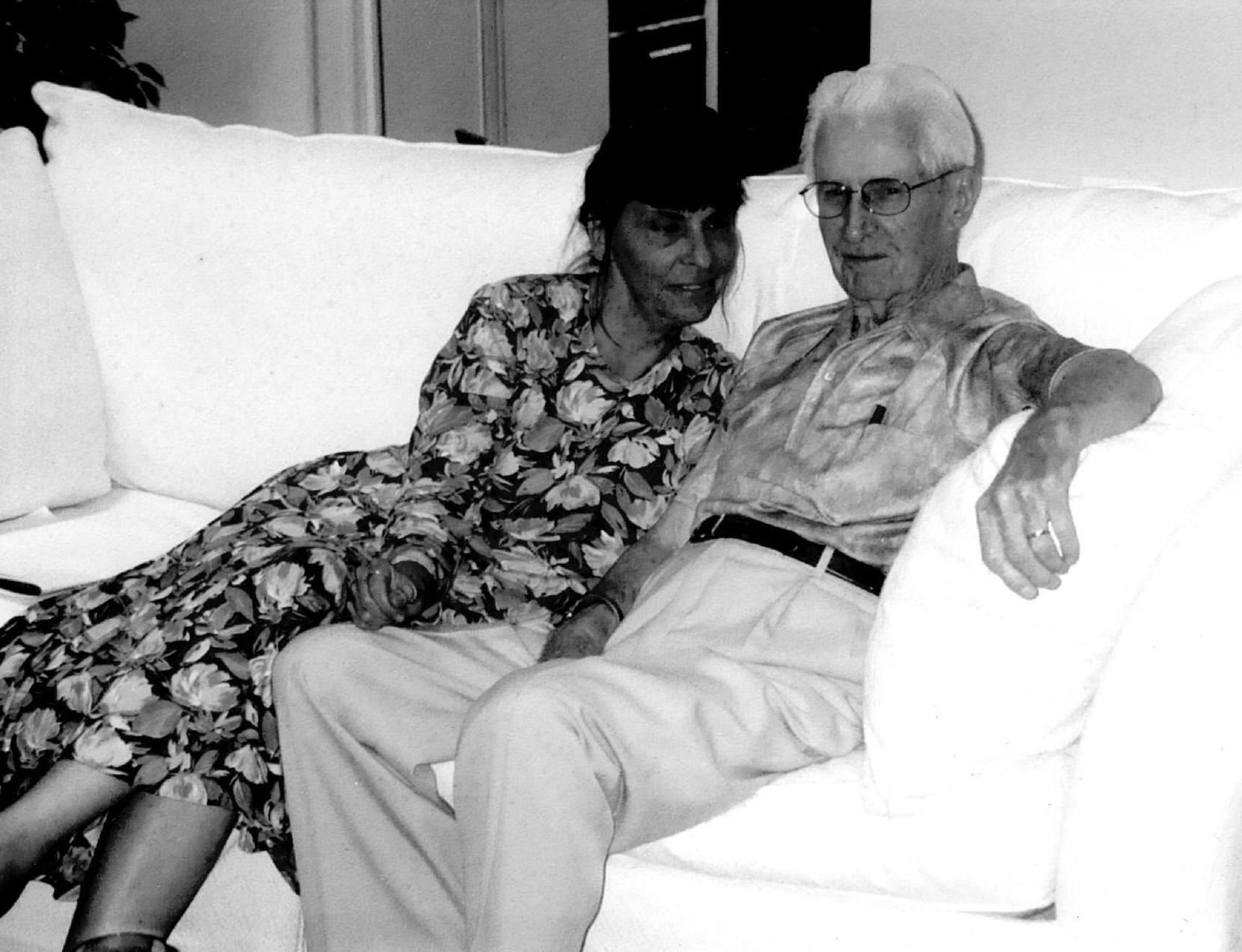
Paul F Smith with his daughter
Sandra










